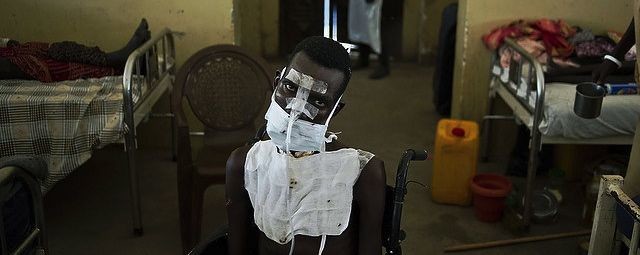Approximately 750 people were wounded in fighting over the last week in the greater Upper Nile region, according to figures compiled by Radio Tamazuj from medical sources.
In the two states of Jonglei and Upper Nile 286 war-wounded people were received in Malakal, 97 received in Kodok, about 300 received in Nasser, 37 received in Lankien, and 30 or more received in Bor, while those who did not reach medical facilities are not included in the total estimate.
“Last week we saw 286 people with conflict related injuries at the International Medical Corps clinic within the UNMISS hospital in Malakal,” IMC Country Director Golam Azam told Radio Tamazuj on Tuesday.
Northward across the river at Kodok, medical authorities said on Friday they were treating 97 wounded soldiers and civilians as a result of ongoing clashes in Malakal. The county’s medical director, Dr. Dak Nyikang, told Eye Radio in Juba, “97 wounded have arrived in Kodok Civil Hospital. We have 5 civilians out of these 97.”
Dr. Dak Nyikang said they urgently needed pain killers, Dicloflex sodium injections, Tramadol and antibiotics. He said they were being helped by two doctors who ran away from Malakal Teaching Hospital because they were threatened and trapped in the hospital last Wednesday evening.
Elsewhere in the state, opposition fighters brought back their wounded from Malakal and other battlefields to Nasser, where MSF-Holland runs a hospital.
According to the UN Office for the Coordination of Humanitarian Affairs (OCHA), “approximately 300 wounded patients were received in Nasir, Upper Nile State for treatment since the escalation of clashes in Malakal.”
However, some opposition fighters last week were reported to have been treated at the UNMISS base in Malakal then released, so it is possible some of the 300 reported treated in Nasser were among those also included in IMC’s figure for war-wounded.
In the neighboring state of Jonglei, 37 war-wounded patients were received in Lankien, in opposition-held territory of Jonglei State. Another 102 were reported to be at Yuai primary healthcare center, but it was not clear whether any of these were wounded in the last week.
Owing to clashes in Gadiang, about 90 km north of the Jonglei state capital Bor, at least 30 wounded soldiers were brought to the Bor hospital for treatment, though the government has so far acknowledged only 16 wounded army soldiers.
Patients hungry
A witness on Monday said he saw wounded SPLA soldiers receiving treatment at the UNMISS compound. They were trapped in the base after the army lost control of the city and their comrades fled northward.
“I found them staying behind the camp among some Nuer and Shilluk IDPs. They are suffering,” an aid worker who preferred anonymity told Gurtong on Sunday.
He added that they were being provided medical treatment but no food, saying “Nobody is caring for them. When they saw me they rushed to me speaking Dinka Bahr el Ghazal language. I was about to shed tears and I offered my money which was not enough. It is really very sad,” he added.
According to OCHA, there is no surgical capacity at the clinic inside the UNMISS base, so presumably treatment for gunshot wounds was fairly rudimentary. The aid agency disclosed that aid organizations are “working on bringing in surgeons, equipment and specialist staff to restore surgical capacity.”
Also some medical facilities at the state’s main civil hospital, Malakal Teaching Hospital, have been destroyed, such as the stabilization centre for victims of malnourishment.
Last week it was reported that some patients were raped and killed at the hospital. According to a recent UNMISS patrol there are still some 100 sick and wounded at the hospital, though not clear how many were hurt during the most recent bout of violence compared to those injured previously.
Photo: A patient being treated for multiple gunshot wounds to the face, chest and throat sits in a wheelchair in the Malakal Teaching Hospital, 7 February 2014 (Carl De Souza/Getty Images)
To contact Radio Tamazuj with comments, news tips or information, write to radiotamazuj@gmail.com or use the contact form.




